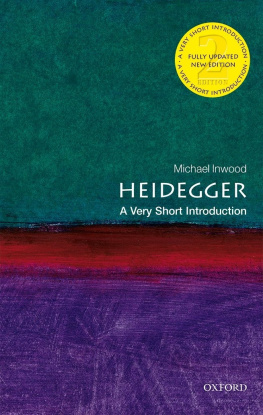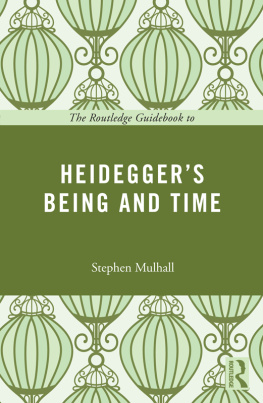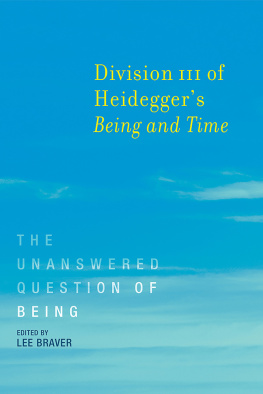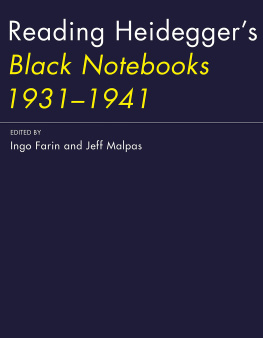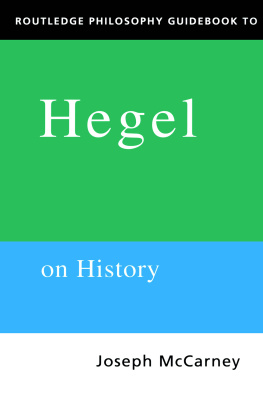
First published in German as Irrnisfuge. Heideggers An-archie, MSB Matthes & Seitz Berlin Verlagsgesellschaft mbH, Berlin, Germany, 2014.
The German edition came into being upon the initiative of Sylvie Crossmann of Indigne ditions, the publishing house of Stphane Hessel's Time for Outrage! (Indignez-vous!), and appeared concurrently with the French edition.
This English edition Polity Press, 2015
Polity Press
65 Bridge Street
Cambridge CB2 1UR, UK
Polity Press
350 Main Street
Malden, MA 02148, USA
All rights reserved. Except for the quotation of short passages for the purpose of criticism and review, no part of this publication may be reproduced, stored in a retrieval system, or transmitted, in any form or by any means, electronic, mechanical, photocopying, recording or otherwise, without the prior permission of the publisher.
ISBN-13: 978-0-7456-9522-8
ISBN-13: 978-0-7456-9523-5 (pb)
ISBN-13: 978-0-7456-9526-6 (epub)
ISBN-13: 978-0-7456-9525-9 (mobi)
A catalogue record for this book is available from the British Library.
The publisher has used its best endeavours to ensure that the URLs for external websites referred to in this book are correct and active at the time of going to press. However, the publisher has no responsibility for the websites and can make no guarantee that a site will remain live or that the content is or will remain appropriate.
Every effort has been made to trace all copyright holders, but if any have been inadvertently overlooked the publisher will be pleased to include any necessary credits in any subsequent reprint or edition.
For further information on Polity, visit our website: politybooks.com
Translators' introduction
There are several noteworthy German terms and their cognates that present difficulties for the English translator, beginning with the original German title of Trawny's book, Irrnisfuge or Errancy-fugue. Irrnis is a rare German word that we have always translated as errancy. As Heidegger employs it, it refers to an originary site of error, rather than to a particular error. When Irre is used in this way, as in Heidegger's On the Essence of Truth, it too is rendered as errancy. When it is used in a more particular sense, it is rendered as error. Irrtum, for its part, is always rendered as error. Other related words include abirren, in die Irre gehen, and verirren (to go astray), Abirrung and Verirrung (aberration), durchirren (to wander through), irren (to err, to be lead astray), Irrfahrt (odyssey), irrig and irrend (errant), and Irrweg (errant path).
The German term Fuge can for its part mean both fugue (in the musical sense) and conjuncture. We have translated this term mostly as conjuncture or joint, though occasionally as fugue, when, for example, Trawny appears to be alluding to Paul Celan's poem Todesfuge (Death Fugue). Other related terms and phrases include aus den Fugen (out of joint), Gefge (conjoined structure), fgen (to join, to structure), and sich fgen (to comply).
In several of Heidegger's texts cited by Trawny, Heidegger employs an archaic spelling of the German Sein (to be), writing it with a y rather than with an i, thus as Seyn. Fortunately, an archaic variant of the English word being also used to be written with a y, enabling us (without recourse to neologism) to translate Seyn as beyng. The modern spelling Sein has been translated as being and its nominalized participle das Seiende as beings.
Ereignis, another Heideggerian term d'art, has confounded translators for decades. While, in everyday German, it just means event, Heidegger often employs it with other valences in mind, such as those of appropriation or bringing something into its own, into what is proper (eigen) to it. We have therefore decided to retain both senses by translating it as appropriative event. Its verbal form (sich ereignen), however, has been rendered simply as to eventuate, although the resonance of appropriation should also be borne in mind.
Finally, unless otherwise indicated, Anfang and anfnglich have been rendered as inception and inceptual, respectively, since in this text they typically have a deeper sense than the start or beginning of anything whatsoever. Beginn has been rendered as beginning.
When Trawny cites a German translation of a non-German text, we have, except in the case of Imre Kertsz's A gondolatnyi csend, amg a kivgzosztag jratlt (A Breath-long Silence, While the Fire Squad is Reloading Their Guns), consulted the original and either provided an existing English translation, or translated the passage from the original ourselves, as with Jean-Luc Nancy's La pense drobe. In such cases, reference to the German translation has been omitted. Where Trawny cites a text originally written in German, we have included Trawny's reference to the German edition and provided a reference to an English translation as well, when one exists. Unless otherwise indicated, we have also used the existing English translations in such cases. When no English edition is specified, it means the translation is our own.
Translators' notes and interpolations in the footnotes and the body of the text have been put in square brackets.
We would like to thank Sean Kirkland for encouraging us to take on the translation, as well as Will McNeill for his helpful suggestions concerning a few tricky terms, and especially for his dedication to teaching and translation. Without the countless hours he devoted to helping us improve our German and translation skills, we would not have been able to undertake seriously, let alone complete, this translation.
Notes
Irrnisfuge: Heideggers An-archie (Berlin: Matthes & Seitz, 2014). English translations include
Poems of Paul Celan, rev. and expanded edn, trans. Michael Hamburger (New York: Persea Books, 2002), 31; and
Selected Poems and Prose of Paul Celan, trans. John Felstiner (New York: W. W. Norton, 2001), 31.
Much is monstrous. But nothing / More monstrous than man. Friedrich Hlderlin, translation of the first stasimon of the chorus of Theban elders from Sophocles Antigone.
Beyng itself is tragic. Martin Heidegger, berlegungen XI.
In this poem, I have sought to bring the monstrousness of the gassings to language. Paul Celan on Death Fugue.
Note
Hlderlin's Sophocles: Oedipus & Antigone, trans. David Constantine (Highgreen: Bloodaxe Books, 2001), 81 [trans. mod.].
Freedom to fail: Heidegger's anarchy
The significance of the publication of the berlegungen [Considerations], of the so-called Schwarze Hefte [Black Notebooks], as Heidegger himself referred to them, is still open. Yet they have shown more clearly than everything published previously by him that what he writes in 1961 at the beginning of his Nietzsche about the latter namely, that the name of the thinker stands as the title for thematter of his thinking holds also for Heidegger himself: The matter, the point in question, is itself a confrontation. Heidegger the name stands for the matter of this thinker, a matter which was always already held to be objectionable, but now with the publication of the berlegungen
Next page



